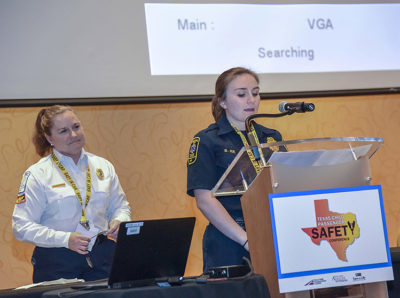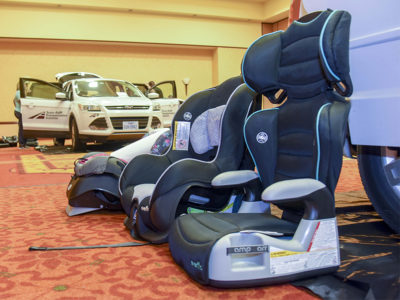In a rare moment for child passenger safety seat technicians (CPSTs), nearly 300 technicians and safety advocates heard firsthand from a mother who assured them that the work they do saved her daughter’s life. Michele and Brooke Ice were the keynote luncheon speakers for the 2018 Texas Child Passenger Safety Conference, held June 24–26 in San Marcos, Texas.

The conference is attended by CPSTs, representatives from child-seat manufacturers and safety advocates from around the state and nation. This was the second Texas Child Passenger Safety Conference, which is made possible by a grant from the Texas Department of Transportation and organized by the Texas A&M Transportation Institute and Texas A&M AgriLife Extension.
“Please know that all the effort, all this training you do is making a difference in kids’ lives. You are giving them a chance to grow up,” Brooke Ice told the crowd. “On behalf of all of them, I want to say thank you. You are all my heroes.”
Brooke Ice was only 10 months old in 1999 when her mother agreed to have her seat inspected. The technicians spent 45 minutes showing Michele Ice numerous misuses, and how to properly install the seat. Two weeks later, a van ran a stop sign and crashed into the side of Ice’s car. Michele suffered life-threatening injuries, but baby Brooke was unharmed. They credit her survival to the proper installation and use of the car seat.
“You saved my daughter’s life,” Michele Ice told the crowd. “If it weren’t for those two technicians that insisted on checking my car seat, Brooke would have died.”
Among other topics, the wide-ranging conference provided CPSTs with the latest information on newly designed car seats, advanced installation techniques, new vehicle safety features, crash analysis results of both correct and incorrect car seat installation, and an examination of the 20-year history of the National Child Passenger Certification Program. | View the Program

“Because there are so many different car seats and vehicle combinations, a lot can go wrong in the installation of the seat and with the way the child is restrained,” TTI Senior Research Scientist Katie Womack explains. “About 80-percent of the seats inspected by CPSTs are installed incorrectly. It’s clear that some of these mistakes could result in fatalities and life-changing injuries. It’s why the work technicians do is so important.”
Most CPSTs work for hospitals, fire departments, ambulance services and other organizations as part of their fulltime jobs. CPSTs are required to be nationally certified each year by attending continuing education courses and safety seat check-up events.
“Even though we don’t know all the lives you have saved, you have saved lives,” Bob Wall, a global safety advocate told the technicians during the closing session of the conference. “The question is, are you ready to continue?”